
page 45
Views borrowed from Judaism.
While in the foregoing section we were content to consider it certain that a conception was derived from Judaism, if the word expressing that conception could be shown to be of Jewish origin, we must now pass on from this method of judging and adopt a new test. We must prove first in detail that the idea in question springs from a Jewish root; then to attain to greater certainty we must further shew that the idea is in harmony with the spirit of Judaism, that apart from Judaism the conception would lose in importance and value, that it is in fact only an off-shoot of a great tree. To this argument may be added the opposition, alluded to in the Quran itself, which this foreign graft met with from both Arabs and Christians. For the better arrangement of these views we must divide them into three groups: A. Matters of Creed or Doctrinal views, B. Moral and legal rules, and C. Views of Life.
We must here set a distinct limit for ourselves, in order on the one hand that we may not drift away into an endless undertaking and attempt to expound the whole Quran; and on the other that we may not go off into another subject altogether and try to set forth the theology of the Quran; an undertaking which was begun with considerable success in the Tübingen Zeitschrift für Evang. Theol. 1881, 3tes Heft. Furthermore, certain general points of belief are so common to all mankind that the existence of any one of them in one religion must not be considered as
proving a borrowing from another. Other views again are so well-known and so fully worked out that we need not discuss them in detail, but shall find a mere mention of them sufficient. Of this kind is that of the idea of the unity of God, the fundamental doctrine of Israel and Islam. At the time of the rise of the latter, this view was to be found in Judaism alone,1 and therefore Muhammad must have borrowed it from that religion. This may be considered as proved without any unnecessary display of learning on the point. The idea of future reward and punishment is common to all religions, but it is held in so many different ways that we shall be obliged to consider it in our argument. Cardinal points of faith have also passed from Judaism into Christianity. To decide whether these points as adopted in the Quran have come from the Jews or from the Christians, we must direct our special attention to a comparison between the forms in which the beliefs are held in both those religions, and the form in which they are presented to us by Muhammad. This is to answer the objection, that in the following discussion so little is to be found about the cardinal dogmas, for even the enumeration of them is foreign to our purpose.
Every religion which conceives God as an active working providence must have some distinct teaching on the creation, and this Muhammad gives in accordance with the Bible, viz., that God created heaven and earth and all that therein is in six days;2 although in another place he diverges somewhat and says that the earth was created in two days, the mountains and the green herbs in four days, and the heavens with all their divisions in two days more.3 Though this passage is nothing but a flight of poetic fancy, still it shows how little Muhammad knew of the Bible, inasmuch as he is aware of nothing but the general fact

that the creation took place in six days, and that he has not any knowledge of each day's separate work. We have already remarked that he calls the seventh day sabt, but does not recognise its sanctity. It remains here to be added that Muhammad appears to allude to and reject the Jewish belief that God rested on the seventh day.1 He evidently thought that a necessity for rest after hard labour was implied, for after mentioning the creation as having taken place in six days, he adds "and no weariness affected Us." On this Jalalu'd-din comments as follows:2 "This was revealed as an answer to the Jews who said that God had rested thoroughly on the sabbath and therefore weariness left Him." The same thing is to be found in Elpherar's commentary but not so clearly expressed.
The idea of several heavens, which is indicated by the Biblical expression "heaven of heavens,"3 came to Muhammad probably from the Jews, also the notion that they were seven in number, a notion due to the different names applied to heaven. In Chagiga4 we find the assertion that there are seven heavens, and then the names are given. All these names occur in the Scripture except the first, viz. vilon, from the Latin velum.5 This name in which heaven is compared to a curtain, which veils the glory of God, is a very important one in the Talmud. Muhammad speaks often of the seven heavens,7 and in one passage he

calls the heavens the seven strongholds1 and in another the seven paths.2 This last expression occurs also in the Talmud.3 During the creation, however, His throne was upon the waters.4 This idea also is borrowed from the Jews, who say:5 "The throne of glory then stood in the air, and hovered over the waters by the command of God." This is somewhat more clearly expressed by Elpherar who says: "And this water was in the middle of the air."6
A second pivot of every revealed religion is the belief in a judgment after death; for while the fact of the creation sets forth the omnipotence of the Creator, the doctrine of a final account teaches that it is God's will that His revealed laws shall be obeyed. This, then, in Judaism developed into a local Paradise and Hell, and both conceptions have, as we have already shown, into Islam. These localities, although at first were symbols, mere embodiments of the spiritual ideas of a state, afterwards became crystallised, and suffered the fate of every symbol, i.e., they were taken for the thing symbolised, and the places were more definitely indicated. Thus the Jews
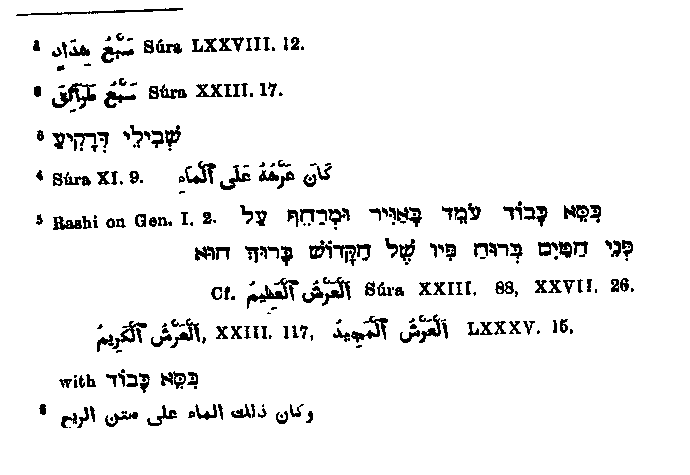
have a saying:1 "The world is the sixtieth part of the garden, the garden is the sixtieth part of Eden;"2 and in the Quran we find a similar expression, viz., "paradise whose breadth equalleth the heavens and the earth:3 Generally speaking, fear is stronger than hope, and the dread of a terrible condemnation appeals far more powerfully than the hope of eternal happiness to a nature which pure religions feeling does not impel to piety of life. This is probably the reason for describing hell in a more detailed and particular manner than Paradise.
Seven hells are pictured as forming different grades of punishment, and these have been developed out of the seven different names mentioned in the Talmud.4 These names with one exception5 (Erets tahtith, subterranean realm, which is clearly adopted from the Roman ideas at the time of their ascendancy) are Biblical. Later on these names came to be construed as seven hells, e.g. in the Midrash on the Psalms at the end of the eleventh Psalm where6 it is said, "there are seven abodes of the wicked in hell," after which the above mentioned names are cited with a few variations. It is also said that David by a sevenfold reiterated cry of "my son" rescued Absalom from the seven habitations of hell7 furthermore hell is said to have seven portals.8 Muhammad is not

behind hand, for we read in one passage that1 "it (hell) hath seven gates, unto every gate a distinct company of them shall be assigned." According to the Jews, a tree stands at the entrance to hell:2 Two date palms grow in the valley of Ben Hinnom, smoke issues from between them and this is the entrance to hell"; but Muhammad knows a tree of hell called Al Zaqqum3 which serves sinners for food, about which he has much to relate. The step from such a definite idea of hell to the notion of a personality connected with it is an easy one, and we find such an individual mentioned by the Rabbis as the "prince of Gehinnom";4 he is called however in the Quran simply Jahannam. In one Rabbinical book5 we find the following: "That the prince of hell says daily, Give me food to satisfy me, comes from Isaiah, v. 14." Muhammad says similarly:6 "On that day We will say unto hell, 'Art thou full?' and it shall say 'Are there more'?"
When the conceptions of Paradise and hell became so definite, and their names were no longer general terms for reward and punishment, a third destination had to be provided for those whose conduct had not been such as to

entitle them to the former nor condemn them to the latter place. Thus while the righteous1 found their place in Paradise, and the sinners had their portion in hell, those who belonged to neither class were placed in a space between Paradise and Hell, of which it is said in the Midrash on Ecclesiastes, vii. 14:2 How much room is there between them? Rabbi Jochanan says a wall; R. Acha says a span; other teachers however hold that they are so close together that people can see from one into the other."3 The idea just touched upon in this passage is most poetically worked out in Sura VII. 44,4 "And between the blessed and the damned there shall be a veil;
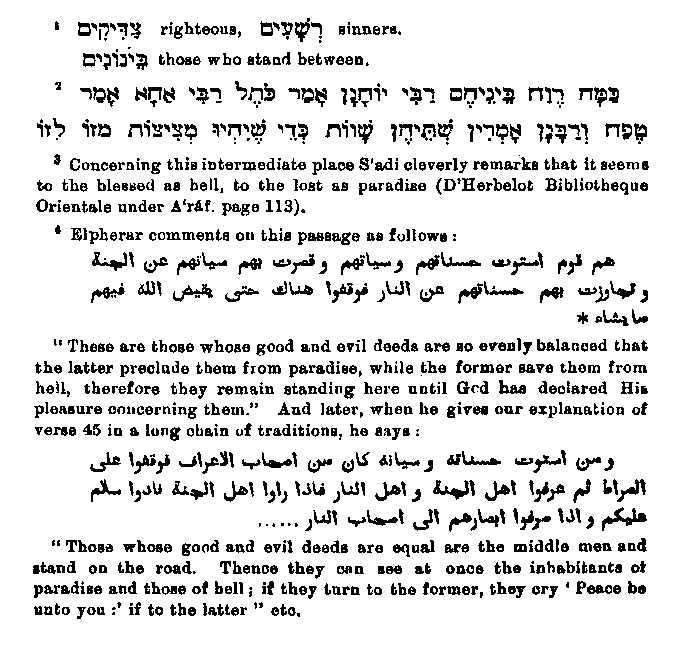
and men shall stand on Al-Araf who shall know thorn by their marks and shall call unto the inhabitants of Paradise saying, Peace be upon you; yet they shall not enter therein, though they earnestly desire it. And when they1 shall turn their eyes towards the companions of hell fire, they rejoice that they are not among them and shew them the folly of their earthly walk and hopes.
It is interesting to compare this view of a threefold dealing with the dead with the very similar Platonic idea.2
The idea of the bliss of eternal life, as well as the metaphor which expresses the difficulty of attaining it, is common to the Quran and Judaism. There is a Rabbinical saying3 to the effect that "one hour of rapture in that world is better than a whole life-time in this." With this we may compare the Quran:4 "And what is this life in comparison with the life to come except a passing amusement?" Then for the difficulty of attaining Paradise we may compare the Rabbinical picture5 of the elephant entering the needle's eye with the words in Sura VII. 88 6 Neither shall they enter into paradise until a camel pass through the eye of a needle." This last metaphor seems to be borrowed from Christianity, partly because of the similarity of the figure, in that "camel" is the metaphor used in the Gospels, and partly because of the frequent mention of the same by the Evangelists7, and is only
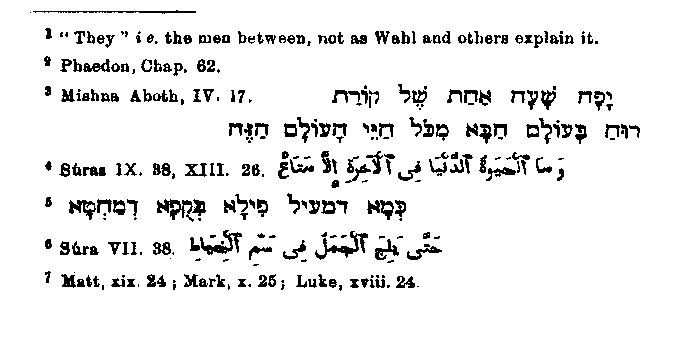
deserving of mention here, because the fact that in the Talmud elephant is used seems to confirm the ordinary translation of the Greek word in the Gospels, and the Arabic word in the Quran, and to remove the doubt as to whether they might not be better rendered "cable."
Given the pure conception of immortality viz., that the life of the soul never ceases, it becomes unnecessary to for a time at which the judgment shall take place; and so in most Talmudic passages a future world is pictured1 in which every thing earthly is stripped away and pious souls enjoy the brightness of God's Presence.2 Echoes of this teaching are to be found in the Quran. In one passage3 we read of a soul gazing on its Lord and in another4 the condition of a perfectly peaceful soul is beautifully described. But this entirely spiritual idea was not thoroughly carried out. Rather by the side of the pure conception of a continued life of the soul after the death of the body,5 there existed that of the quickening of the dead.6 Thus because the man cannot receive the requital

of his deeds while he is still in a state of death, the time of resurrection must be the time for the judgment.1
These two views of the resurrection and the judgment day, though different in themselves, are both closely connected in Judaism and more especially in Islam.2 In Judaism there is a third period the advent of a Messiah, which it is not easy to separate from the other two. Naturally this time, which is to bring forth two such important events as judgment and resurrection, will be ushered in by terrible signs. In Judaism statements to this effect are to be found only about the third period, which is generally connected with the other two, viz., the earthly period of the Messiah; in Islam on the contrary everything is attributed to the last day. The utterance most in accord with the Talmud is that in Sannas 41 and 141, which says that learning shall vanish, ignorance shall take root, drunkenness and immorality shall increase. With this we must compare the passage in Sanhedrin 97:3 "At the time when David's son comes the learned diminish, and the place of learned meetings serves for immorality." The descriptions in the Quran refer more to the last day itself, and remind us of many passages in Holy Scripture, where it is also said of those days that the world will bow itself before God, the heavens will be rolled together4 and
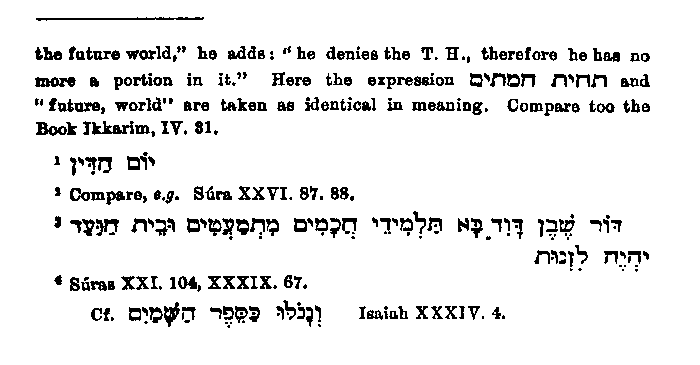
vanish in smoke,1 all cities will be destroyed,2 and men will be drunken and yet not drunken3.
Another very distinct sign of the advent of a Messiah, which is remotely alluded to in the Bible but which attained to an extraordinary development in the Talmud and especially in later writings, is the battle of Gog, Prince of Magog.4 Gog and Magog are, however, named by the Rabbis as two princes, and this view has taken root in the Quran in the Rabbinical form,5 since two persons, Gog and Magog, are mentioned as dwellers in the uttermost parts of the earth.6
In the details of the idea of future retribution many resemblances are to be found, which, by virtue of the unity of the Jewish view and its derivation from the Scriptures, show themselves as borrowings from Judaism. Thus according to the Talmud, a man's limbs themselves shall give testimony against him;7 in one passage we find those words: "The very members of8 a man bear witness against him, for it is said: 'Ye yourselves are my witnesses saith the Lord.'" With this we may compare Sura XXIV. 24 9 "Their own tongues, and hands, and feet, shall one day be witness against them of their own doings.10 The judgment
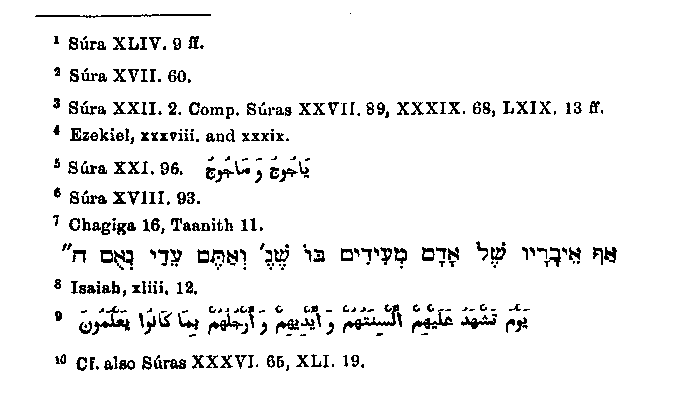
day gains also a greater importance from the fact that not only individuals and nations appear at it, but also those beings who have been honoured as gods by the nations, and they too receive punishment with their worshippers. In Sukkah XXIX we find this statement:1 "As often as a nation (on account of idolatry) receives its punishment, those beings honoured by it as gods shall also be punished for, it is written:2 'Against all the gods of Egypt I will execute judgment.'" That this general sentence admits of a reference to the punishment of the last day is not expressly stated, but it is worthy of acceptation. Muhammad expresses himself still more clearly about it:3 "Verily both ye and the idols which ye worship besides God shall be cast as fuel into hell fire."
A view closely interwoven with Judaism and Islam is that retributive punishment is entirely confined to the state after death, and that any single merit which a sinner has gained will be rewarded in this world, to the end that nothing may impede the course of judgment in the next. The same view, only reversed, holds good in the case of the righteous. It is a view which was thought to explain the course of destiny upon earth, which so often seems to run contrary to the merits and demerits of men.
The Rabbinical view is expressed in the following passage:4 "Whereunto are the pious in this world to be

compared? To a tree which stands entirely in a clean place; and when a branch bends to an unclean place, it is cut off and the tree itself stands there quite clean. Thus God sends afflictions in this world to the righteous, that they may possess that which is to come, as it is written 'Though thy beginning was small, yet thy latter end showed greatly increase.'1 Sinners are like a tree which stands in an altogether unclean place; if a branch bends over to a clean place, it is cut of and the tree itself stands there quite unclean. Thus God allows the ungodly to prosper, in order to plunge them into the lowest depth of hell, as it is written: 'There is a way which seemeth right unto a man, but the end thereof are the ways of death.'2" Muhammad expresses this same view in several passages, but restricts himself to the latter part which refers to the prosperity of sinners, partly because his own ideas were too unspiritual for him to be able to imagine the righteous as truly happy without earthly goods, partly because in so doing his teaching would have lost in acceptability to his very degraded contemporaries. Thus in one passage3 we read: "We grant them long and prosperous lives only

that their iniquity may be increased,"1 still the second view is to be found among the Arabians also, e.g., Elpherar in his comments on Quran XII. 42 2 says "It is said that the righteous are punished and tried, in order that the day of resurrection may be perfect in light and power, as the contumacy of the righteous has been already expiated." Muhammad naturally avoided specifying any time at which the judgment should take place, though he was much pressed to do so. He excused himself with the Jewish saying that with God a thousand years are as one day,3 which was divested of its poetic adornment and taken by the Rabbis in a purely literal sense.4 Muhamnad says:5 "Verily one day with thy Lord is as a thousand years of those which ye compute"; and again6 "On the day whose length shall be a thousand years of those which ye compute."
As has been already shown, with the establishment of
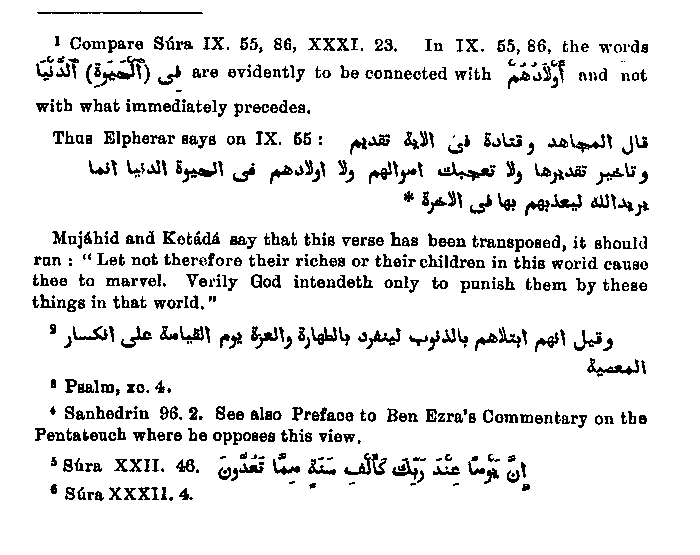
the doctrine of the day of judgment, the view of the resurrection and of the quickening of the dead was also formed; and this the more readily, because it found support in expressions in the Scripture, as e.g those in Ezekiel, xxxvii.:1 "I have opened your graves, and caused you to come up out of your graves, ye shall live," etc.; and those in other passages referring partly to the metaphorical quickening of the dead land of Israel. Of this doctrine it is said that it is such a fundamental teaching of the Jewish faith that the declaration that it did not belong to the law entailed the exclusion of him who thus spoke from eternal life.2 The Quran is, so to speak, founded upon this doctrine along with that of the unity of God, and there is scarcely a page in it where this doctrine is not mentioned. To adduce proofs here would be as easy as it would be useless; and indeed it is not required by our purpose, since Christianity also has inherited this view from Judaism, as is shown in the argument of Jesus in refutation of the Sadducees. Only one point deserves particular mention, because on the one hand it contains a detail adopted from Judaism, and on the other it shows the low level of thought at that time.
As soon as it becomes a question not merely of the immortality of the soul, but also of the resurrection of the body, then the soul without its body is no longer regarded as the same person, and the question naturally presents itself to the ordinary understanding: "How can this body which we have seen decay rise again, so that the same personality shall reappear?" Neither the soul alone nor the body alone is the person, but the union of the two. Now one part of this union is dissolved; another body can indeed be given to this soul, but by this means he who died

does not reappear, but a new man, another personality, another consciousness comes into being. This question dimly anticipated obtrudes itself, and can only be set at rest by proving that the very same personality can appear again. Instead of showing this Muhammad contents himself with the parable, used also occasionally in the Talmud, of the renewal of the dried up earth by fertilising rain. He found however that be could not silence the common convictions of men thereby,1 and so he was compelled to come back to it again and again. The Jews also sought to give prominence to this resemblance, and they put the eulogium2 "who sendeth down the rain" into the second benediction which treats of the resurrection.3 The fact that the righteous rise actually in their clothes4 (which after all is not more wonderful than in their bodies) is explained by the parable of the grain of wheat, which is laid in the earth without covering, but springs up again with many coverings. The passage in Quran VI. 96 contains a similar statement. This view is not strange to Islam, for a saying which is attributed to Muhammad runs thus: 5 "The dead man shall be raised in the clothes in which he died."
That from the standpoint of revealed religion the brief in the possibility of revelation is fundamental needs of course no proof, and in this the views of all revealed religions are alike; yet differences can be found in the manner of conceiving of the revelation, and here we recognise again that Muhammad derived his view of it from Judaism, of course with some modification.

The Jews have a saying that "all tbe prophets saw through a dark glass, but Moses through a clear one,"1 and Muhammad says:2 It was not granted to a man that God should speak unto him otherwise than in a vision or from behind a veil;3 and then he adds4 "or by the sending of a messenger to reveal by His permission that which He pleaseth." This messenger is the Holy Spirit,5 or simply the spirit,6 like the spirit in the story of Micaiah's vision.7 The Arabic commentators take this holy spirit to mean Gabriel, a view which is not unknown to the Jews, for

the Jewish commentators understand the words1 "the definitely speaking Spirit" to refer to Gabriel. One of Muhammad's own utterances, one which is fully exaimined only by the 52nd Sunna, is much more striking:2 "And they will ask thee of the spirit, say the spirit (proceedeth) at my Lord's command."
With this the teaching about angels is closely connected, and it also had its beginning in Scripture, but appears to have been developed in later days especially through Parseeism. Muhammad is unwearied in his descriptions of angels; so too are the later Jews in their many prayers on the day of atonement, but these are of rather late origin.3 The angel of death4 is specially mentioned in Sura XXXII. 11.
While angels were regarded as purely spiritual beings who execute God's commands, a class of beings was imagined who stood between man and the purest spirits; these were mixed spirits, who were made out of fire,5 who possessed superior mental powers, but who were mostly inclined to evil, they were called6 demons, but there are numerous other names for them in Arabic. The Talmud has the following statement about them:7 "Demons

are declared to possess six qualities, three of which are angelic and three human. The three which pertain to angels are that they have wings, that they can fly from one end of the earth to the other (i.e. they are bound by no space), and that they know the future beforehand. They know the future beforehand? No! but they listen behind the curtain. The three human qualitites are that they eat and drink, increase and multiply,1 and die."2 Muslim tradition cannot do enough in their description, but there is but little about them in the Quran. The fact that they listened at the canopy of heaven gained for them in the Quran the nickname of the stoned,3 for, say the commentators, the angels threw stones to drive them away when they found them listening.4 Thus it is said expressly5 We have appointed thorn (the lamps of heaven) to be darted at the devils." The seventy-second Sura treats of them in detail, and seeks especially to set forth their assent to the new doctrine. The Talmud also states that they are present at the giving of instruction. The following
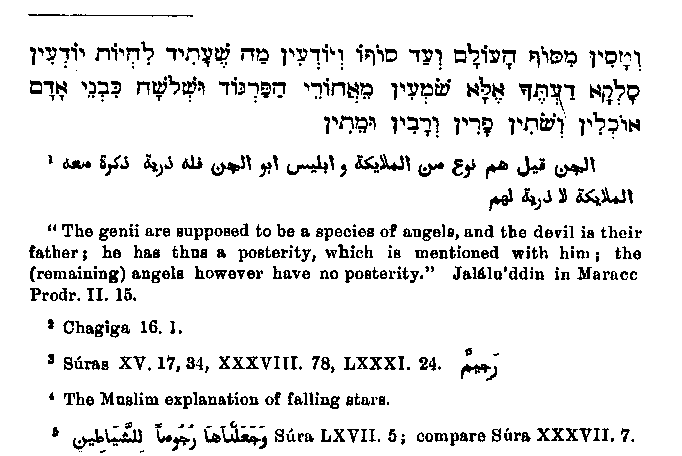
passage from the Berachoth shows this "The press in the school is caused by them, the demons."1 With this we may compare the Quran "When the servant of God stood up to invoke Him, it wanted little but that the genii had pressed on him in crowds."2 It cannot be maintained that the greater part of the teaching about genii was adopted from Judaism, it must rather be said to have come from the same dark source whence the Jews of those times drew these conceptions, viz., Parseeism.
Still here, as in the case of any point which is of inaccessible origin, a reference to a mere similarity is not without use.
Under these four heads then, viz., (1) Creation, (2) Retribution including the Last Judgment and the Resurrection, (3) Mode of Revelation, and (4) Doctrine of Spirits, details are found, the adoption of which from Judaism we may regard as sufficiently proved. The precaution against representing, out of love for our theme, that which is common either to the general religious feelings of mankind, or to all revealed religions, or at least that which belonged to other known religious parties in Muhammad's time as peculiar only to Judaism, compels as to fix these limits. We have found much of interest especially under the second head, so that the demands of our theme might seem to be fairly well satisfied.
It is obvious that in a revealed religion all individual commands form part of the religion, and therefore one cannot draw any sharp line of distinction between the "religious" and the "moral." We have accordingly

considered nothing which has to do with conduct under the heading A, even thongh it might be immediately connected with the points of belief under discussion and so we are able to bring together here all commands as to conduct. From the fact that every individual command is Divine, a conflict of duties may easily arise, which cannot be readily decided by private judgement, seeing that all the commandments are equal,1 so far as their Author is concerned. Rules for such cases must therefore be laid down. For instance, we find the following statement in the Rabbinical writings2 "If a father saith (to his son if be is a priest), 'defile thyself'; or if he saith, 'Make not restitution (of the thing found to the owner)', shall he obey him? Therefore, it is written3 'Let every man reverence his father and mother, but keep my Sabbaths all of you, ye are all bound to honour me'" And Muhammad says:4 "We have commanded man to show kindness towards his parents, but if they endeavour to prevail with thee to associate with me that concerning which thou hast no knowledge, obey them not."
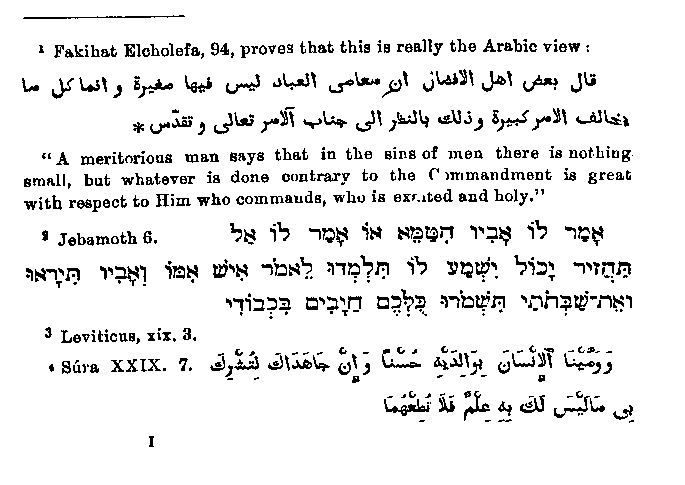
Judaism is known to be very rich in single precepts, and Mubammad has borrowed from it much that seemed to him suitable.
I. Prayer. Muhammad like the Rabbis prescribes the standing position1 for prayer. Thus: "Stand obedient to the Lord; but if ye fear any danger, then pray while walking or riding";2 and also: "Who standing, and sitting, and reclining, bear God in mind."3
These three positions are mentioned again in Sura X. 13 4 "When evil befalleth a man he prayeth unto Us, lying on his side or sitting or standing," where with a true perception of the right order, the least worthy position is the first spoken of.5
Baidhawi comments thus on Sura III. 188, the passage alluded to above: "The meaning is that the man may take any of the three positions according to his strength, as Muhammad said to Amran Ibn Husain: "Pray standing if thou art able; if not, sitting; and if thou canst not sit up, then leaning on tho side."6 The Jews were not so strict in this matter, yet they too have the rule that prayer should be offered standing;7 and in Rabbinical writings it is also

said that he who rides on an ass is to dismount but the addition is made that, if he cannot dismount he is to turn his face (towards Jerusalem).1 As the bodily position may be altered in urgent cases, so the prayer itself may be shortened on similar occasions.2 So we find the permission to shorten prayer in time of war: "When ye march to war in the earth,3 it shall be no crime in you if ye shorten your prayers." The Jews also were permitted to pray a short prayer when in a dangerous place.4 Muhammad is quite opposed to senseless chattering, for he counts it a merit in believers to "eschew all vain discourse".5 Therefore because attention and pious concentration of thought are to be aimed at, he enjoins6 on believers not to draw near to prayer when they are drunk. This is in accordance with the Talmudic rule: "Prayer is forbidden to the drunken."7 It is also forbidden to those who have touched women.8 These persons may not engage in

prayer before washing with water, which cleansing is recommended as a general rule before prayer both in the Quran1 and in the Talmud. Instead of water, purification with sand may take place.2 So in the Talmud: "He cleanses himself with sand and has then done enough." As concentrated thought is urged as a duty, it follows that prayer though audible must not be noisy,3 and so Muhammad says: "Pronounce not thy prayer aloud, neither pronounce it with too low a voice, but follow a middle way between these;" and in the Talmud we find:4 "From the behaviour of Hannah who in prayer moved her lips we learn that he who prays must pronounce the words, and also as her voice was not heard we learn that he must not raise his voice loudly." But because our mood does not at all times move us to fervency of prayer, outward ceremony is necessary, and indeed prayer in a great congregation, whose devotion will stir up our own.5 "The prayer in the congregation"6 is greatly praised also by the Jews. Daybreak, which is mentioned in the Talmud in connection with the Shema prayer, as the time when "one can distinguish between a blue and a white thread,"7 is not mentioned in this connection in the

Quran it is true, for the Quran knows nothing of a Shema prayer, but it appears in connection with the beginning of the Fast Day:1 "Until ye can discern a white thread from a black thread by the daybreak."
2. Some rulings in respect of women tally with Judaism; e.g., the waiting of divorced woman for three months before they may marry again.2 The time of suckling is given in both as two years3 "Mothers shall give suck unto their children two full years." Similarly in Sura XLVI 14 we find: "His bearing and his weaning is thirty months," which is explained by Elpherar as follows4 "He takes the shortest duration of pregnancy, Viz., six months, and the shortest of suckling, viz., twenty-four months." Compare the Talmudic saying:5 "A woman is to suckle her child two years, after that it is as though a worm sucked." That those relatives to whom inter-marriage is forbidden in the Scripture are precisely those whom Muhammad permits6 to see their near relations unveiled has been already noticed by Michaelis in the Mosaic system, and he has shown the connection between these two laws.

As Muhammad had very little intention of imposing a new code of individual laws, since his aim was much more the spread of new purified religious opinions, and as in the matter of practice he was far too much of an Arab to deviate from inherited usages, unless they came directly into opposition to these higher religious views, it is easily to be explained how so few borrowings are to be found in this part and much even of what is adduced might perhaps be claimed to be general oriental custom. We shall find moreover in the Appendix that Muhammad mentions many Jewish laws which were known to him; he alludes to these sometimes as binding on the Jews, sometimes merely for the sake of disputing them, and hence we see that it was not want of knowledge of them that kept him back from using them, but his totally different purpose. This remark must apply also to our third heading, under which isolated instances of adaptation only will be found, except in cases where the view is directly connected with the higher articles of Faith adopted from Judaism, which have been already mentioned.
In putting together these single fragmentary utterances, it is scarcely worth while to arrange them according to any new system, and we will therefore follow the order of the Quran.
Death with the righteous is to be prized, hence the request in the Quran: "Make us to die with the righteous,"1 which corresponds with that of Balaam, "Let me die the death of the righteous.

"Say not of any matter, 'I will, surely do this tomorrow,' unless then add, 'If God please.'"1 Full understanding is first imputed to a man when he is forty years old,2 and it is said in the Mishna: "At forty years of age a man comes to intelligence." So the hunting for some particular persons, to whom this sentence of the Quran shall apply, as the Arabic Commentators do, appears altogether unnecessary; it is also rendered very dubious by the wide differences between the various opinions.
In the Quran a comparison is found between those who bear a burden without understanding the nature of it and who thus carry without profit, and an ass carrying books.3
"He who intercedeth (between men) with a good intercession shall have a portion thereof."4 This saying is very similar to the Hebrew one: "He who asks for mercy for another while he needs the same thing himself obtains help

first." In Sunna 689 it is said "Three things follow the dead, but two of them turn back; his family, his goods, and his works follow him; his family and his goods forsake him again, and only his works remain with him." This is also found in great detail in Rabbinical Hebrew:1 "Man has three friends in his life time, - his family, his property, and his good works. At the time of his departure from earth he collects the members of his family, and says to them, 'I beg you, come and free me from this evil death.' They answer: 'Hast thou not heard2 that no one has power over the day of death.' It is also written:3 'None of them can by any means redeem his brother, even his
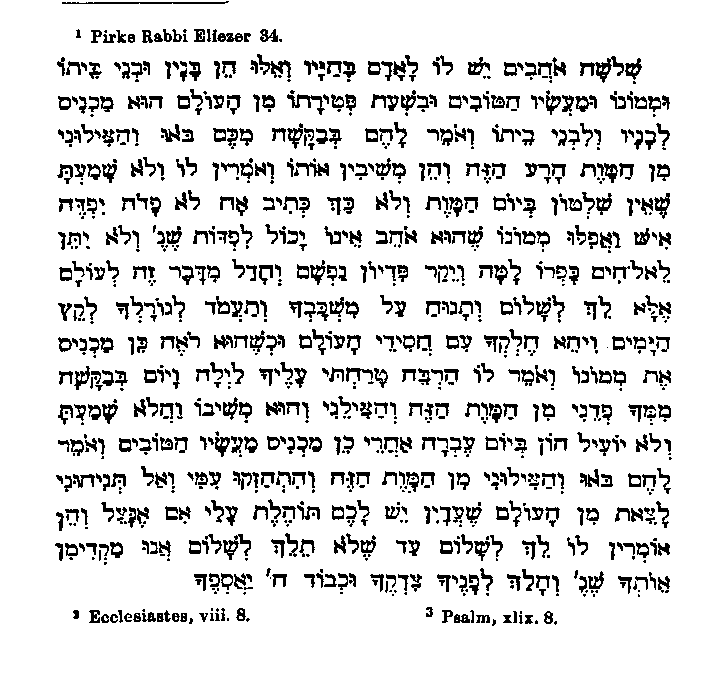
wealth which he loves avails not, he cannot give to God a ransom for him, for the redemption of their soul is costly and must be let alone for ever; but enter thou into peace, rest in thy lot till the end of days.1 May thy part be with the righteous.' When the man sees this, he collects his treasures and says to them: 'I have laboured for you day and night, and I pray you redeem and deliver me from this death' but they answer: 'Hast thou not heard that riches profit not in the day of wrath?2 So then he collects his good works and says to them 'Then you come and deliver me from this death, support me, let me not go out of this world, for you still have hope in me if I am delivered.' They answer: 'Enter into peace! but before thou departest we will hasten before thee; as it is written, Thy righteousness shall go before thee, the glory of the Lord shall be thy reward.'"
